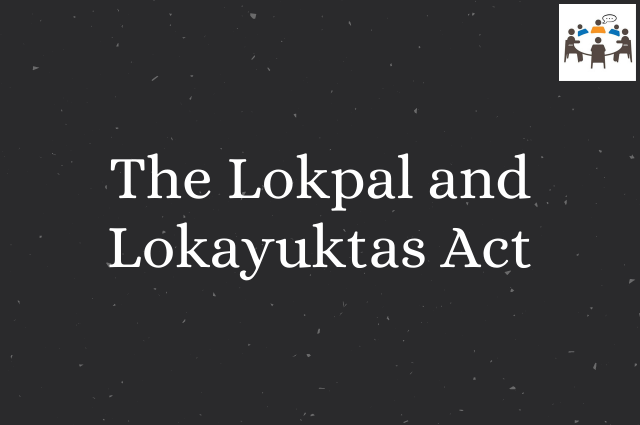What is the Lokpal and Lokayuktas Act, 2013:
- It is an anti-corruption act. This act deals with the allegations of corruption against public servants and government officials.
- Lokpal deals with corruption cases against public servants of the central government.
- Lokayukta deals with corruption cases against public servants of state government.
Background:
- In 1966, the ‘Administrative Reforms Commission’ (ARC) headed by Morarji Desai recommended the creation of ‘Lokpal’ in the centre & ‘Lokayukthas’ in the states to instil public faith in the government.
- In 1968, the Lokpal bill was introduced in Lok sabha but couldn’t be passed.
- A few states have already implemented Lokayukthas in their states. Maharastra is the first state to implement Lokayukta in their state through ‘The Maharashtra Lokayukta and Upa-Lokayuktas Act’, 1971.
- Again, till 2013 Lokpal bill was introduced in Lok sabha several times, but couldn’t succeed.
- Several social activists drafted their own version of the Lokpal bill. Aruna Roy and civil society activists are among them. Anna Hazare and his team drafted the Jan Lokpal bill, which is famous among all.
- Govt didn’t pass any of these versions but did several modifications to the govt version of the Lokpal bill according to the suggestions by social activists.
- Anna Hazare started an indefinite fast for the Jan Lokpal bill in 2011.
- In 2011, Lokpal Bill was passed in Lok Sabha, but couldn’t pass in Rajya Sabha.
- Finally, with pressure from the public and Anna Hazare, Lokpal Bill was passed in December 2013. But, there are many differences between govt version of the Lokpal Bill and the Jan Lokpal bill.
- The Lokpal and Lokayuktas (Amendment) Bill was passed in 2016, which amended the Lokpal and Lokayuktas Act, 2013.
- Pinaki Chandra Ghose was appointed as the first Lokpal in the year 2019.
Features:
- Lokpal contains a maximum of 8 members, half of them will be judicial members. And remaining half of them will be from SC/ST/OBC, minorities and women.
- Lokpal members will be elected by a committee consisting of Prime Minister, Speaker of Lok Sabha, Leader of Opposition in the Lok Sabha, Chief Justice of India or a sitting Supreme Court judge nominated by CJI, eminent jurist to be nominated by the President of India on the basis of recommendations of the first four members of the selection committee.
- Every public servant including the prime minister comes under Lokpal. The Prime minister can be prosecuted only if 2/3rd of the Lokpal members approve it.
- Lokpal will have the power of superintendence and direction over any investigation agency including CBI for cases referred to them.
- For false complaints, imprisonment can be given for a maximum of 1 year and a fine of up to 1 lakh rupees.
- The inquiry has to be finished in 60 days. And investigation must be completed within 6 months. And the punishment has to be declared within 2 years.
- Lokpal can set up special courts.
- All entities receiving donations from foreign sources more than 10 lakh per year come under the jurisdiction of Lokpal. Religious bodies, charitable trusts are excluded from this.
- Transfers of CBI officers, who are dealing with the cases referred by Lokpal, have to be approved by Lokpal.
- Lokpal can start the prosecution in special courts even without a charge sheet or prior sanction.
- Lokpal has the power to confiscate the property of the corrupt, even if the case is pending.
Benefits of Lokpal act:
- Lokpal is a great weapon to reduce corruption.
- As the timeline for the investigation was mentioned, there will be no delay in punishing the corrupted officials.
- The burden of solving corruption cases will be reduced for judicial courts.
Loopholes:
- Lokpal can’t take the grievances from the public directly.
- Though the Lokpal have no political members, the committee which selects Lokpal members consist of politicians. So, Lokpal is not completely free from political interference.
- CBI was not made as an independent body as proposed by the Jan Lokpal bill.
- Lokpal deals with corrupt politicians and Central Vigilance Commission (CVC) deals with corrupt bureaucrats. So, there is a chance of a clash between these Lokpal and CVC, as the corruption happens mostly by the involvement of politicians and bureaucrats together.
- Lokpal can’t register FIR. The prosecutions made by Lokpal will be considered as preliminary inquiries.
- Lokpal has no special police force. So, it can’t protect whistleblowers too. Lack of protection for whistleblowers can deter people from complaining against public servants.
- Lokpal has no jurisdiction over foreign affairs ministers, security and defence ministers. So, the corruption in these departments will go unnoticed.
- Fear of fine and imprisonment for false complaints may deter even genuine complaints.
Conclusion:
Though Lokpal has some drawbacks, now at least we have a law to prosecute corrupt public servants. Lokpal has the potential to restore the public faith in the Government. And it must be amended to make it a stronger weapon against corruption.
Your Turn…
What are your thoughts on Lokpal and Lokayuktas Act, 2013? Express your thoughts through the comment section below. And subscribe to our blog to read answers to the trending GD topics.
Copyright @ Group Discussion Ideas.

